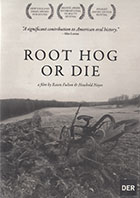
Root Hog or Die 1978
Distributed by Documentary Educational Resources, 101 Morse Street, Watertown, MA 02472; 617-926-0491
Produced by Dan Kain
Directed by Rawn Fulton
DVD, black & white, 56 min.
Middle School - General Adult
Agriculture, Culture, Sociology, Documentaries, Area Studies, History, Sustainable Living, New England
Date Entered: 12/20/2016
Reviewed by Joseph Baumstarck, Jr., University of Louisville, Southern Baptist Theological Seminary, Ivy Tech Community CollegeRoot Hog or Die is a documentary about life as it was in a few remaining rural areas of Massachusetts and Vermont in 1973. This lifestyle is significant because it goes back to what life in much of the fledgling New England colonies was like when America was in its founding throes. Historically significant is that the attitudes and lifestyle reflected in this modern day cultural anomaly are those which the founding fathers were familiar with and relied on when drafting the critical inaugural documents of this country. This film shows an industrious, earth centered people who helped each other when needed and lived in a tight community of shared values based on hard work and respect for the land which provided for their needs.
Based on a seasonal motif the film depicts the farming and homesteading activities which these dairy farming based communities experienced in an endless cycle passed on from generation to generation with each generation adding as able to the farming enterprises of the past. Yet, throughout the human scale is maintained and is reflected in the film by the performance of a whole range of activities by each individual. Activities expected of these yeomen farmers included maple sugaring, plowing, planting, cultivating, haying, logging, clearing fields, fence building and repair, harvesting crops, cutting, splitting, and stacking firewood, raising and processing meat animals to include cattle, sheep, pigs, poultry, horses, and other draft animals. In addition, each farm family was expected to market its own excess products, purchase needed supplies and items which could not be produced on the farm, raise, educate, and train a new generation to continue the enterprises, and contribute as able to community activities. Far from the lonely and difficult life many modern Americans would see this as, the oral histories conducted with some of the survivors of this process show a deep love for the people around them, the land they earned their existence from, and pride in their achievements. Critical of the discontent experienced by many today, the apparent listlessness and perceived inability to persist in the face of difficulties, and obviously favoring the way they are living their lives the narrators persist in reminding viewers of the sustainable nature of their lifestyle both in the material and more ethereal aspects.
Poignant reminders exist throughout, that the lifestyle depicted by the film is rapidly passing from existence and that the generation replacing the narrators is no longer as intermeshed with the land. Jobs in the cities and a capitalistic economy are leading to the erosion of the sustainable lifestyle the film describes.
A major weakness of the Root Hog or Die is its datedness. It was filmed in 1973. Although the situation depicted in the film is still valid for today as a historical view of what once was an updated version would be very useful. Especially a version which makes more explicit many of the connections between what the film depicts and America’s foundational history. Better explanations of the activities would also make the film more useful and easier to understand by younger audiences for whom a piece of horse drawn farm machinery is a fairy tale.
This film is recommended for anyone working with American history from middle school through college level students. General audiences will also appreciate the film, but the black and white film might take some getting used to. Library programs, especially for homeschool families could easily use this film for family nights and discussion activities. Those interested in purchasing this film need to be aware that there are several films available with the title Root Hog or Die including a documentary about the cartoonist John Porcellino, a Confederate camp in Arkansas, and several others. Some of these appear to be updated versions of this film, but are not.
Awards
- New England Emmy Award for Sound
- Bronze Award International Film and Theatre Festival
- Winner Connecticut Film Festival>/ul>